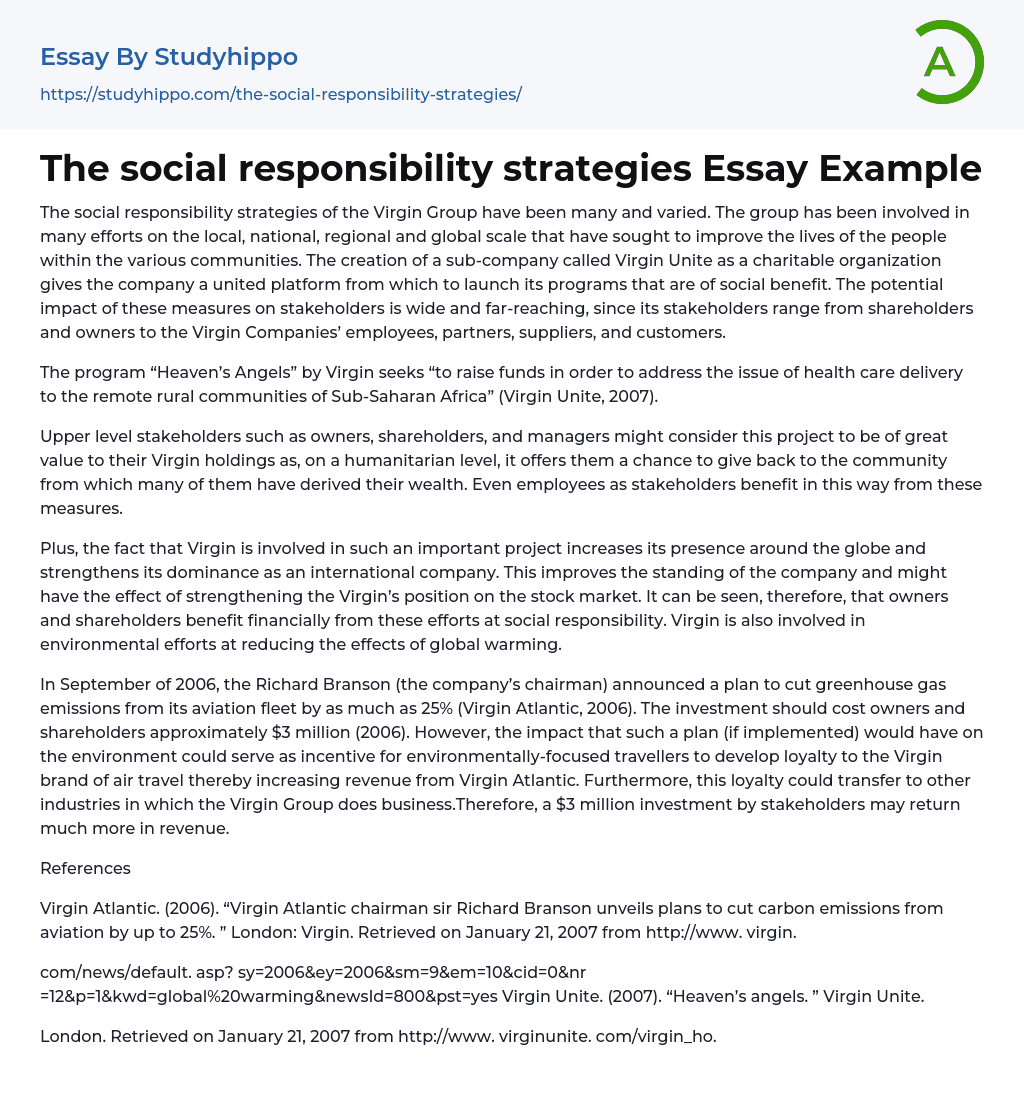The social responsibility strategies of the Virgin Group have been many and varied. The group has been involved in many efforts on the local, national, regional and global scale that have sought to improve the lives of the people within the various communities. The creation of a sub-company called Virgin Unite as a charitable organization gives the company a united platform from which to launch its programs that are of social benefit. The potential impact of these measures on stakeholders is wide and far-reaching, since its stakeholders range from shareholders and owners to the Virgin Companies’ employees, partners, suppliers, and customers.
The program “Heaven’s Angels” by Virgin seeks “to raise funds in order to address the issue of health care delivery to the remote rural communities of Sub-Saharan Africa” (Virgin Unite, 2007).
Upper
...level stakeholders such as owners, shareholders, and managers might consider this project to be of great value to their Virgin holdings as, on a humanitarian level, it offers them a chance to give back to the community from which many of them have derived their wealth. Even employees as stakeholders benefit in this way from these measures.
Plus, the fact that Virgin is involved in such an important project increases its presence around the globe and strengthens its dominance as an international company. This improves the standing of the company and might have the effect of strengthening the Virgin’s position on the stock market. It can be seen, therefore, that owners and shareholders benefit financially from these efforts at social responsibility. Virgin is also involved in environmental efforts at reducing the effects of global warming.
In Septembe
of 2006, the Richard Branson (the company’s chairman) announced a plan to cut greenhouse gas emissions from its aviation fleet by as much as 25% (Virgin Atlantic, 2006). The investment should cost owners and shareholders approximately $3 million (2006). However, the impact that such a plan (if implemented) would have on the environment could serve as incentive for environmentally-focused travellers to develop loyalty to the Virgin brand of air travel thereby increasing revenue from Virgin Atlantic. Furthermore, this loyalty could transfer to other industries in which the Virgin Group does business.Therefore, a $3 million investment by stakeholders may return much more in revenue.
References
Virgin Atlantic. (2006). “Virgin Atlantic chairman sir Richard Branson unveils plans to cut carbon emissions from aviation by up to 25%. ” London: Virgin. Retrieved on January 21, 2007 from http://www. virgin.
com/news/default. asp? sy=2006&ey=2006&sm=9&em=10&cid=0&nr =12&p=1&kwd=global%20warming&newsId=800&pst=yes Virgin Unite. (2007). “Heaven’s angels. ” Virgin Unite.
London. Retrieved on January 21, 2007 from http://www. virginunite. com/virgin_ho. php
- Air Pollution essays
- Carbon Dioxide essays
- Climate essays
- Deforestation essays
- Ecology essays
- Endangered Species essays
- Environmental Issues essays
- Environmental Protection essays
- flood essays
- Greenhouse Gas essays
- Hurricane essays
- Nature essays
- Pollution essays
- Renewable Energy essays
- Sustainability essays
- Tornado essays
- Traffic essays
- Tsunami essays
- Water Pollution essays
- Ambition essays
- Anger essays
- Betrayal essays
- Boredom essays
- Confidence essays
- Courage essays
- Desire essays
- Disgrace essays
- Doubt essays
- Empathy essays
- Fairness essays
- Fear essays
- Feeling essays
- Forgiveness essays
- Grief essays
- Guilt essays
- Happiness essays
- Harmony essays
- Hate essays
- Honesty essays
- Honor essays
- Hope essays
- Humanity essays
- Inspiration essays
- Kindness essays
- Laughter essays
- Loneliness essays
- Lost essays
- Loyalty essays
- Need essays
- Passion essays




